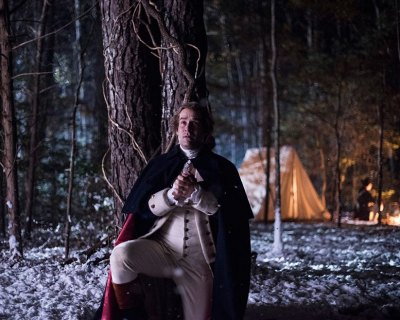'Turn' serves up revolutionary history

George Washington prays to his brother's ghost.
Image: Antony Platt, AMC.
This is business as usual for AMC’s Revolutionary War drama. Even so, during the first season, fans were rewarded week after week by a show so smart, so well-written and beautifully acted that it seemed likely the network would cancel it.
Now well into its second season, the drama again delivers a compelling story line that focuses on the central figures of a spy ring operating out of Setauket, Long Island, along with their British rivals.
To be sure, Turn is more historyish than history, even though based on the nonfiction book, Washington’s Spies: The Story of America’s First Spy Ring (Bantam; 2006), by Alexander Rose.
The series often strays from the historical. During a recent episode, Nathaniel Sackett (the Colonial version of James Bond's Q) is brutally murdered by an English spy. The real Sackett wasn’t murdered. He lived through the Revolution -- which Rose points out in his book.
In another episode, English officials barge into the London apartment of American sculptress Patience Wright. After confronting her about a document missing from the palace, they shoot her. But Wright wasn’t executed. She died from injuries suffered during a fall in 1786 – after the war, according to a biography by the Bordentown Historical Society in New Jersey.
And much of the show's dramatic tension revolves around the protagonist, Abraham Woodhull (Jamie Bell), who works to conceal his espionage activities from his wife, Mary (Meegan Warner) and father (Kevin McNally). The action is set in 1776 and 1777 -- but in his book, Rose notes that the historic Woodhull didn’t marry until 1781.
To be sure, the flights of fancy aren’t as egregious as those in another recent Revolutionary War drama, the History Channel’s Sons of Liberty. (Think Sam Adams in a sharp leather coat leaping from rooftop to rooftop in the manner of Batman.)
The difference may be that the fictionalizations of Turn are done in a manner consistent with the general thread of the time and events. Turn gives us truth, if not accuracy, about the Revolution. Here's how:
- It offers a depiction of Washington under pressure.
In Washington, The Indispensable Man (Back Bay Books; 1969), historian James Thomas Flexner described the Founding Father's reaction when, early in the war, undisciplined troops fled the battlefield. Galloping after the men, hollering and swinging his whip, all to no avail, Washington “soon loomed on horseback alone," Flexner wrote. "Some fifty of the enemy dashed toward him. He watched them without moving. Had not aides galloped up and pulled him away, he would have been killed or captured. He was, General Nathanael Greene wrote, ‘so vexed at the infamous conduct of his troops that he sought death rather than life.’ ”
In other words, Washington spaced out.
No wonder. He wasn't getting much sleep. In 1776, the general wrote this: “The reflection upon my situation and that of this army produces many an uneasy hour when all around me are wrapped in sleep. Few people know the predicament we are in.”
- The series presents a plausible picture of women during the Revolution.
Turn gives women more expansive roles -- information gatherers, signal agents, and, at times, knowing pawns. John Andre (JJ Feild), the British spymaster, recruits women to entrap the enemy. On the American side, one of the characters, Anna Strong (Heather Lind), is based loosely on a woman suspected of taking part in the spy ring. In his book, Rose is restrained when writing about Strong’s role. At one point, he describes her as Woodhull’s “occasional accomplice,” whereas the character portrayed by Lind is a strong-willed central figure.
This is another case of historyish versus history. But it is plausible conjecture.
- The African-American characters, both slaves and former slaves, are depicted in a way that feels authentic.
So with that as a premise, would African-Americans of the time be better off investing their loyalties with the British or with the rebels? One of the most powerful story lines explores this question with two fictional characters: Abigail, (Idara Victor), a onetime slave who is now a servant/spy in the Andre household, and Jordan (Aldis Hodge), a former slave who becomes second in command of the Queen’s Rangers.
- The series airs Colonial grievances in a matter-of-fact way.
“He should never have been in our house,” Woodhull concludes. “We do not need their [England's] laws, their taxes or their protection, and I will not stop my mission for Washington until the last king’s man has set sail back to England.”
- By focusing on a band of spies, Turn puts a spotlight on consequential people, some of whom are not widely known.
An example on the American side is Benjamin Tallmadge (Seth Numrich), the American spymaster and soldier who went on to become a congressman.
And then, of course, there is Woodhull. The one-time spy later served as judge of Suffolk County, New York, Rose wrote. He died in 1826 without discussing his wartime service.
But that’s what made him a good spy.
Related:
Washington's prayer at Valley Forge: Fact or fiction?
If you would like to comment, contact us or like us on Facebook and tell us what you think.

